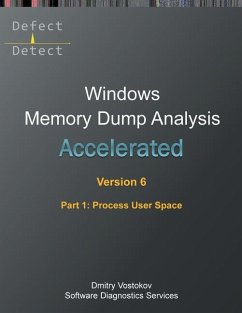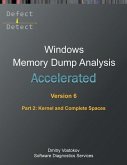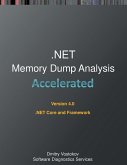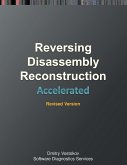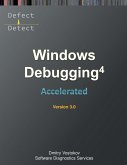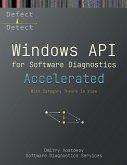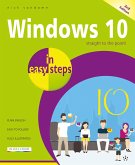Dmitry Vostokov, Software Diagnostics Services
Accelerated Windows Memory Dump Analysis, Sixth Edition, Part 1, Process User Space
Training Course Transcript and WinDbg Practice Exercises with Notes
Dmitry Vostokov, Software Diagnostics Services
Accelerated Windows Memory Dump Analysis, Sixth Edition, Part 1, Process User Space
Training Course Transcript and WinDbg Practice Exercises with Notes
- Broschiertes Buch
- Merkliste
- Auf die Merkliste
- Bewerten Bewerten
- Teilen
- Produkt teilen
- Produkterinnerung
- Produkterinnerung
Analyze crashes and freezes, navigate through user space and diagnose heap corruption, memory and handle leaks, CPU spikes, blocked threads, deadlocks, wait chains, and more using WinDbg debugger.
Andere Kunden interessierten sich auch für
![Accelerated Windows Memory Dump Analysis, Sixth Edition, Part 2, Kernel and Complete Spaces Accelerated Windows Memory Dump Analysis, Sixth Edition, Part 2, Kernel and Complete Spaces]() Dmitry VostokovAccelerated Windows Memory Dump Analysis, Sixth Edition, Part 2, Kernel and Complete Spaces92,99 €
Dmitry VostokovAccelerated Windows Memory Dump Analysis, Sixth Edition, Part 2, Kernel and Complete Spaces92,99 €![Accelerated .NET Memory Dump Analysis: Training Course Transcript and WinDbg Practice Exercises for .NET Core and Framework, Fourth Edition Accelerated .NET Memory Dump Analysis: Training Course Transcript and WinDbg Practice Exercises for .NET Core and Framework, Fourth Edition]() Dmitry VostokovAccelerated .NET Memory Dump Analysis: Training Course Transcript and WinDbg Practice Exercises for .NET Core and Framework, Fourth Edition150,99 €
Dmitry VostokovAccelerated .NET Memory Dump Analysis: Training Course Transcript and WinDbg Practice Exercises for .NET Core and Framework, Fourth Edition150,99 €![Accelerated Disassembly, Reconstruction and Reversing: Training Course Transcript and WinDbg Practice Exercises with Memory Cell Diagrams, Revised Edi Accelerated Disassembly, Reconstruction and Reversing: Training Course Transcript and WinDbg Practice Exercises with Memory Cell Diagrams, Revised Edi]() Dmitry VostokovAccelerated Disassembly, Reconstruction and Reversing: Training Course Transcript and WinDbg Practice Exercises with Memory Cell Diagrams, Revised Edi92,99 €
Dmitry VostokovAccelerated Disassembly, Reconstruction and Reversing: Training Course Transcript and WinDbg Practice Exercises with Memory Cell Diagrams, Revised Edi92,99 €![Accelerated Windows Debugging 4D: Training Course Transcript and WinDbg Practice Exercises, Third Edition Accelerated Windows Debugging 4D: Training Course Transcript and WinDbg Practice Exercises, Third Edition]() Dmitry VostokovAccelerated Windows Debugging 4D: Training Course Transcript and WinDbg Practice Exercises, Third Edition92,99 €
Dmitry VostokovAccelerated Windows Debugging 4D: Training Course Transcript and WinDbg Practice Exercises, Third Edition92,99 €![Accelerated Windows API for Software Diagnostics: With Category Theory in View Accelerated Windows API for Software Diagnostics: With Category Theory in View]() Dmitry VostokovAccelerated Windows API for Software Diagnostics: With Category Theory in View98,99 €
Dmitry VostokovAccelerated Windows API for Software Diagnostics: With Category Theory in View98,99 €![Memory Dump Analysis Anthology, Volume 15 Memory Dump Analysis Anthology, Volume 15]() Dmitry VostokovMemory Dump Analysis Anthology, Volume 1556,99 €
Dmitry VostokovMemory Dump Analysis Anthology, Volume 1556,99 €![Windows 10 in Easy Steps Windows 10 in Easy Steps]() Nick VandomeWindows 10 in Easy Steps13,99 €
Nick VandomeWindows 10 in Easy Steps13,99 €-
-
-
Analyze crashes and freezes, navigate through user space and diagnose heap corruption, memory and handle leaks, CPU spikes, blocked threads, deadlocks, wait chains, and more using WinDbg debugger.
Produktdetails
- Produktdetails
- Verlag: Opentask
- 6th edition
- Seitenzahl: 356
- Erscheinungstermin: 27. Januar 2024
- Englisch
- Abmessung: 279mm x 216mm x 23mm
- Gewicht: 1143g
- ISBN-13: 9781912636921
- ISBN-10: 1912636921
- Artikelnr.: 69922033
- Herstellerkennzeichnung
- Libri GmbH
- Europaallee 1
- 36244 Bad Hersfeld
- gpsr@libri.de
- Verlag: Opentask
- 6th edition
- Seitenzahl: 356
- Erscheinungstermin: 27. Januar 2024
- Englisch
- Abmessung: 279mm x 216mm x 23mm
- Gewicht: 1143g
- ISBN-13: 9781912636921
- ISBN-10: 1912636921
- Artikelnr.: 69922033
- Herstellerkennzeichnung
- Libri GmbH
- Europaallee 1
- 36244 Bad Hersfeld
- gpsr@libri.de
Dmitry Vostokov is an internationally recognized expert, speaker, educator, scientist, and author. He is the founder of pattern-oriented software diagnostics, forensics and prognostics discipline, and Software Diagnostics Institute. Vostokov has also authored more than 50 books on software diagnostics, anomaly detection and analysis, software and memory forensics, root cause analysis and problem solving, memory dump analysis, debugging, software trace and log analysis, reverse engineering, and malware analysis. He has more than 25 years of experience in software architecture, design, development, and maintenance in a variety of industries, including leadership, technical, and people management roles. Dmitry also founded Syndromatix, Anolog.io, BriteTrace, DiaThings, Logtellect, OpenTask Iterative and Incremental Publishing, and Software Diagnostics Technology and Services (former Memory Dump Analysis Services) and Software Prognostics. In his spare time, he presents various topics on Debugging TV and explores Software Narratology, its further development as Narratology of Things and Diagnostics of Things (DoT), Software Pathology, and Quantum Software Diagnostics. His current areas of interest are theoretical software diagnostics and its mathematical and computer science foundations, application of formal logic, artificial intelligence, machine learning, and data mining to diagnostics and anomaly detection, software diagnostics engineering and diagnostics-driven development, diagnostics workflow and interaction. Recent interest areas also include cloud native computing, security, automation, functional programming, applications of category theory to software development and big data, and diagnostics of artificial intelligence.

